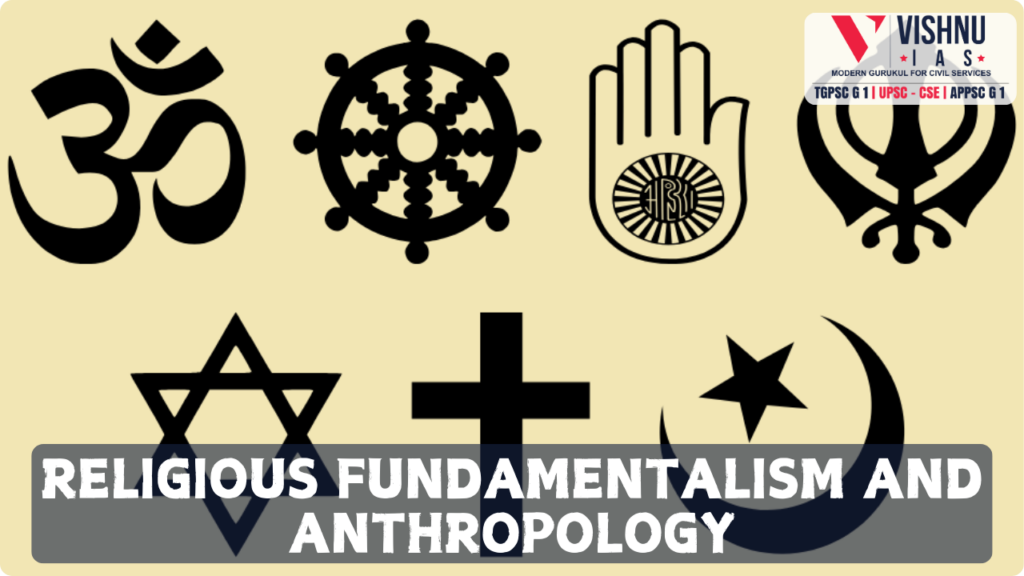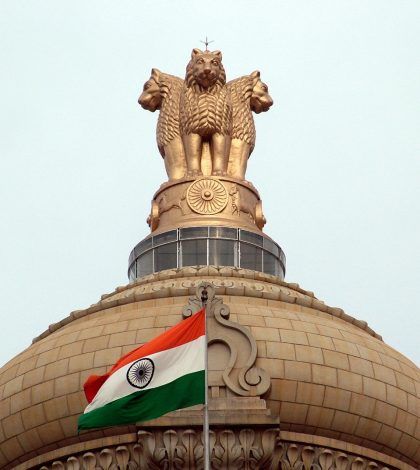Religious Fundamentalism and Anthropology
Approach
- Introduction: add their significance in few lines
- Body: add comprehensive analysis about the difference between secularism, religiosity, religious fundamentalism and spiritualism from an anthropological perspective
- Conclusion: Add its contemporary context
INTRODUCTION
Understanding Secularism, Religiosity, Religious Fundamentalism, and Spiritualism from an Anthropological Perspective
Secularism
Secularism is the principle of separating religion from civic affairs and government. It advocates for a public sphere where religion does not influence political decisions and policies. From an anthropological perspective, secularism can be seen as a response to the pluralistic nature of modern societies, where multiple religious beliefs coexist. It aims to ensure that no single religion dominates the public sphere, thereby promoting equality and freedom of belief.
- Example:In India, secularism is practiced as “sarva dharma sambhava,” meaning equal respect for all religions, ensuring that the state does not favour any particular religion.
Religiosity
Religiosity refers to the intensity of religious beliefs and practices in an individual’s life. It encompasses various dimensions such as belief in religious doctrines, participation in religious rituals, and the importance of religion in daily life. Anthropologists study religiosity to understand how religious beliefs shape social behaviours, cultural practices, and community structures.
- Example:The high level of religiosity in rural Indian communities often manifests in daily rituals, festivals, and community gatherings centered around religious practices.
Religious Fundamentalism
Religious Fundamentalism is characterized by a strict adherence to specific theological doctrines, often in opposition to modernity and secularism. Fundamentalists typically advocate for a return to what they perceive as the original principles of their faith. Anthropologically, religious fundamentalism can be seen as a reaction to social changes and perceived threats to religious identity.
- Example: The rise of Hindu fundamentalism in India, which seeks to promote Hindu values and practices in response to globalization and perceived threats from other religious communities.
Spiritualism
Spiritualism involves a personal quest for meaning and connection with the transcendent, often outside the confines of organized religion. It emphasizes individual experiences of the divine or the sacred. Anthropologists study spiritualism to explore how individuals seek personal fulfilment and understanding of their place in the universe.
- Example:The increasing popularity of yoga and meditation practices in urban India as forms of spiritual exploration, often independent of traditional religious frameworks.
Comparative Analysis
- Secularism vs. Religiosity: While secularism seeks to keep religion out of public affairs, religiosity focuses on the personal and communal aspects of religious life.
- Religiosity vs. Religious Fundamentalism: Religiosity can be moderate or intense, whereas religious fundamentalism is marked by extreme adherence to specific doctrines.
- Religious Fundamentalism vs. Spiritualism: Fundamentalism is often rigid and communal, while spiritualism is flexible and individualistic.
- Secularism vs. Spiritualism:Secularism is a political and social principle, whereas spiritualism is a personal and often apolitical pursuit of the sacred.
Here’s a table summarizing the differences between secularism, religiosity, religious fundamentalism, and spiritualism from an anthropological perspective:
Table
Concept | Definition | Key Characteristics | Anthropological Perspective | Examples |
Secularism | Principle of separating religion from civic affairs and government | – Public sphere free from religious influence<br>- Promotes equality and freedom of belief | Seen as a response to pluralistic societies, ensuring no single religion dominates the public sphere | India’s “sarva dharma sambhava” (equal respect for all religions) |
Religiosity | Intensity of religious beliefs and practices in an individual’s life | – Belief in religious doctrines<br>- Participation in rituals<br>- Importance in daily life | Examines how religious beliefs shape social behaviours, cultural practices, and community structures | High level of religiosity in rural Indian communities, manifesting in daily rituals and festivals |
Religious Fundamentalism | Strict adherence to specific theological doctrines, often opposing modernity | – Extreme adherence to doctrines<br>- Opposition to modernity and secularism | Viewed as a reaction to social changes and perceived threats to religious identity | Rise of Hindu fundamentalism in India, promoting Hindu values against globalization |
Spiritualism | Personal quest for meaning and connection with the transcendent | – Individual experiences of the divine<br>- Often outside organized religion | Explores how individuals seek personal fulfilment and understanding of their place in the universe | Popularity of yoga and meditation in urban India as forms of spiritual exploration |
This table provides a clear comparison of these concepts, highlighting their definitions, key characteristics, anthropological perspectives, and examples.
CONCLUSION
- Understanding these concepts from an anthropological perspective helps us appreciate the diverse ways in which humans relate to the sacred and the secular, and how these relationships shape societies and cultures.
Anthropology Full Course at Vishnu IAS Academy
What does Course Offer?
- 4 Months (250+ Class Hours)
- Online (App + Web) / Offline / Hybrid Mode of Classes
- Live + Recorded Videos Access For 1 Year
- 2 Hour Live Class From Monday to Saturday (1.5 Hours for Class + ½ Hour for Doubt Solving)
- Foundation to Advanced Level of Teaching
- Simple and Integrated Content
- One Stop Solution Books
- Regular Value Added Content
- Current Affairs & Case Studies Modules
- Daily Answer Writing Practice
- Weekly Grand Tests On Sundays & Evaluation With Guidance and Topper Will be Rewarded
- 500+ Model Answers
- 9 AM – 9 PM Support System
- Free GS Current Affairs
- Free Interview Guidance for Anthropology


